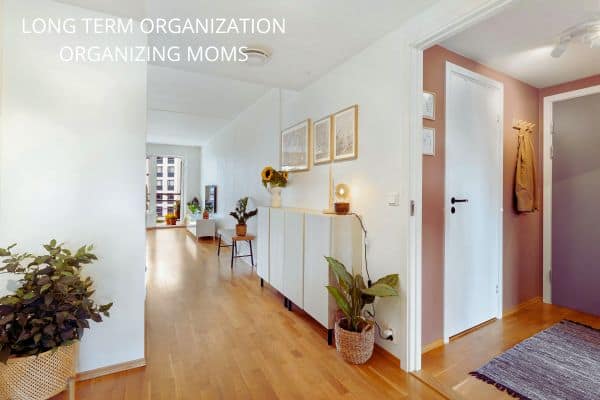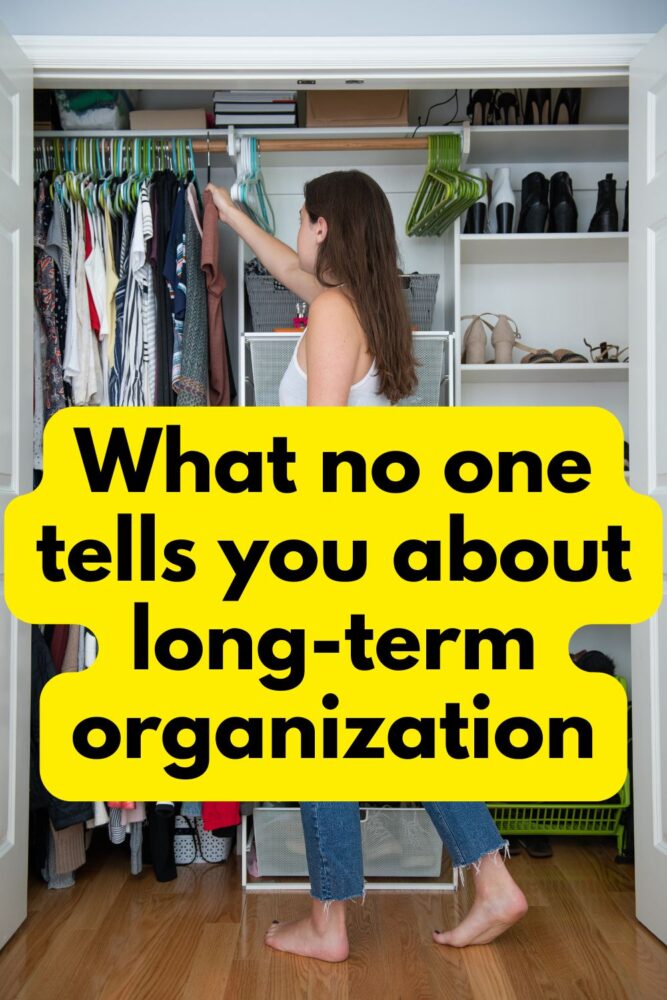Inside: Results of your organization project not lasting? How to use long-term organization strategies that support you in your home and life.
Long-Term Organization

We’ve all been there. You spend an entire weekend organizing your home, everything looks Instagram-perfect, and you swear this time it’s going to stay that way forever.
Fast forward three months, and you’re stepping over piles of who-knows-what wondering how your beautifully organized space turned into this chaos again. 🤦♀️
You’re not alone, and surprisingly, it’s not just about willpower or being naturally “messy.”
The truth is, there’s a huge gap in home organization advice about what makes systems actually stick around long-term.
We have zillions of books on how to declutter, but almost nothing tells us how to keep those spaces tidy when real life happens!
Why Nobody Talks About This
Most organization gurus focus on the exciting makeover phase—you know, those satisfying before-and-after photos that make us all click “buy now” on storage bins we don’t need.
But sustainable organization isn’t about that initial weekend warrior session.
It’s about what happens during the Tuesday evening rush when everyone’s hungry, homework needs checking, and no one can’t find the right cleats for tonight’s practice.
As it turns out, long-term organization studies are practically non-existent because they’re:
- Not as Instagram-worthy as transformation stories
- Super complicated to research (life happens!)
- Way less marketable than “organize your home in a weekend!” promises
So we’re left piecing together tips from behavioral science, habit experts, and that one friend who somehow maintains a tidy home despite having five kids and a dog (how does she do it?!).
The Real Reasons Home Organizing Systems Crash and Burn
Before we fix the problem, let’s get real about why most organization systems fall apart faster than a toddler’s attention span:
- They’re too rigid for real life. Systems that work in an Instagram reel but not during flu season? Doomed from the start!
- They demand superhero-level consistency. Any system requiring daily perfection will collapse the week of swim lessons and soccer practice.
- They’re not personalized. Organization isn’t one-size-fits-all—your family’s situation makes a big difference in what will work, obviously.
- They can’t handle life transitions. Back-to-school, holidays, new baby? These are organization system killers without a survival plan.
- They offer no comeback strategy. Most systems tell you how to set up but not how to bounce back after a crazy month (or Tuesday!).
- They don’t help you build organizing and decluttering skills.
Related: Using Organizing Fails to Create Helpful Systems
Building Organization That Actually Lasts (Even With Kids!)
While there’s no magic bullet (sorry!), we can borrow some science-backed strategies to create organization systems with staying power:
1. Design for your ACTUAL life, not your fantasy Instagram life
Be honest – where do the backpacks really end up? Where does mail naturally pile up? Instead of fighting these patterns, work with them!
Try this today: Notice where things naturally collect in your home this week. That’s where your storage solutions belong – even if it’s not where you “should” put them. If backpacks always land on the kitchen chair, put a hook right there instead of expecting them to make it to the mudroom.
2. Embrace the “Good Enough” approach
A system that works pretty well most of the time will beat a “perfect” system every single time.
Try this today: Create a 10-minute “reset routine” you can use after busy days. Not a deep clean – just a quick restoration of basic order. For bonus points, get the kids involved with a racing game: “Can we beat the timer?”
3. Piggyback on habits you already have
Research by BJ Fogg from Stanford University says attaching new habits to existing routines makes them way more likely to stick. Use this to your advantage!
Try this today: Pick something you do without fail (making coffee, brushing teeth) and attach ONE small organization task to it. “After I start the coffee maker, I’ll clear off the kitchen counter.” That’s it!
4. Use “If-Then” planning for predictable messes
Those behavioral scientists know what they’re talking about! Creating specific plans for common situations helps you respond automatically.
Try this today: Write down three “if-then” plans for your biggest clutter culprits: “If Amazon packages arrive, then I’ll open them and recycle the boxes immediately.” Put it on a sticky note where you’ll see it!
5. Make maintaining EASIER than making a mess
The simpler it is to put something away, the more likely it’ll happen. If organizing requires Olympic-level effort, it won’t last!
Try this today: Go through your most-used storage areas and ask: “Could my 7-year-old put something away here in under 5 seconds?” If not, simplify!
6. Plan for the inevitable mess comeback
Let’s face it – sometimes life gets crazy and clutter wins. Having a recovery plan is your secret weapon!
Try this today: Schedule one 30-minute “reset session” on your calendar each week. Make it fun with your favorite podcast or an audiobook. This is your safety net for when life happens!
The Honest Truth
No home stays perfectly organized all the time – especially not with kids, pets, partners, and, you know, LIFE happening all around us.
The most sustainable systems aren’t about perfection—they’re about having reasonable expectations and simple ways to get back on track when things slide.
The goal isn’t a showroom home. It’s a functional space that supports your family without making you feel like a failure when it’s not perfect (which is most of the time, let’s be real!).
Want to Learn More?
If you’re curious about the behavioral science behind sustainable organization, here are some of my favorite resources:
Where applicable, I’ve included links to Amazon for your convenience. As an Amazon affiliate, I earn from qualifying purchases.
- Tiny Habits by BJ Fogg – Life-changing approach to building habits that actually stick
- The EAST Framework – Making behaviors easier to maintain
- Organization for Different Brains – Because we’re all wired differently!
- Maintenance-Focused Organization – For when you’re ready to go beyond the initial cleanup
PS: While I’ve shared some evidence-based strategies here, even organization experts admit we need more research on what actually works long-term in real homes with real families. If you discover something that works amazingly well for your family, please share it with us!


New to this community? Start here, friend!








